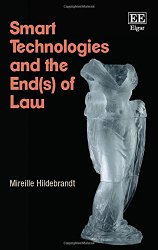$135.00
$104.57
(SAVE Now!)
as of 12/22/2024 (Details)
'Do conceptions of the Rule of Law reflect timeless truths, or are they in fact contingent on a particular information and communications infrastructure - one that we are fast leaving behind? Hildebrandt has engineered a provocative encounter between law and networked digital technologies that cuts to the heart of the dilemma confronting legal institutions in a networked world.'- Julie E. Cohen, Georgetown University, US'Many contemporary authors are wrestling with two technological developments which will change our society beyond recognition: big data analytics and smart technologies. Few though understand, or can explain, these developments in the way Mireille Hildebrandt does. In ambitiously bringing together legal theory, psychology, social ethnology and of course smart agency and ambient intelligence, Hildebrandt gives the most complete study of these vitally important developments. Books are often described as 'must read' though few actually are; this one genuinely is.'- Andrew Murray, London School of Economics, UKThis timely book tells the story of the smart technologies that reconstruct our world, by provoking their most salient functionality: the prediction and preemption of our day-to-day activities, preferences, health and credit risks, criminal intent and spending capacity.Mireille Hildebrandt claims that we are in transit between an information society and a data-driven society, which has far reaching consequences for the world we depend on. She highlights how the pervasive employment of machine-learning technologies that inform so-called 'data-driven agency' threaten privacy, identity, autonomy, non-discrimination, due process and the presumption of innocence. The author argues how smart technologies undermine, reconfigure and overrule the ends of the law in a constitutional democracy, jeopardizing law as an instrument of justice, legal certainty and the public good. Nevertheless, the book calls on lawyers, computer scientists and civil society not to reject smart technologies, explaining how further engaging these technologies may help to reinvent the effective protection of the Rule of Law.Academics and researchers interested in the philosophy of law and technology will find this book both discerning and relevant. Practitioners and policy makers in the areas of law, computer science and engineering will benefit from the insight into smart technologies and their impact today.
Technical Details
No features available.